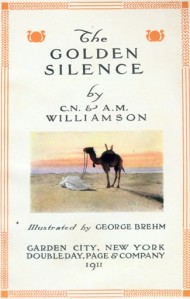I’ve been going back and forth on whether to post about The Brightener. On one hand, this might be the wildest thing my pals A.M. and C.N. Williamson ever wrote. On the other, the fun will consist of recounting the plot in detail, and I usually try to avoid doing that. Still, I can’t not tell you about this book. One friend I told about it said, “I’ve been worrying about the plot of my book, but actually you can do anything.” Another said, “People really knew about PLOTS then.” My no-spoiler synopsis is: everything happens.
So, if you’d rather be surprised–repeatedly–stop here and go read the book. If you’re not worried about spoilers, sit down. Stay a while. I’m about to recap the first quarter of the book in absolutely bonkers detail.
First of all, there’s a princess. She was Elizabeth Courtenaye, but her grandmother married her off to an Italian prince who very promptly died. This is a favorite gambit of the Williamsons, who love a virgin with the rights of a widow. The grandma promptly dies, too, and Elizabeth is left with nothing but a title, a beautiful and historic estate in Devonshire, and her exceedingly good looks. Oh, and an enemy: a distant American cousin who used to be a cowboy and has red hair and black eyebrows.
On the advice of her lawyer’s wife, Elizabeth rents the estate to the cousin and becomes a “brightener”–a sort of professional society problem solver who can use her title and unimpeachably blue blood for the benefit of her clients–nouveaux riches trying to break into society, or American millionaires trying to marry members of it. Roger Fane is the latter, and he’s in love with Elizabeth’s friend Lady Shelagh Leigh. Her guardians don’t like him, so Elizabeth helps him organize a yacht trip that’s intended to soften them up.
Things take a turn for the weird almost immediately. An object floating in the sea near them turns out to be neither bird nor plane nor shark, but a coffin. They bring it on board, where it will hang out in Roger’s bathroom and make everyone super uncomfortable until they can hand it over to the authorities at the next port. The atmosphere is strained, and Elizabeth is pleased to be able to escape to her stateroom at the end of the day. That is, she would be pleased, if the room didn’t reek of brandy and there wasn’t a stranger in her bed.
On closer examination, Elizabeth recognizes the stranger as the German spy who tried to burn her house down a couple of years ago. I haven’t mentioned this incident because it’s not actually relevant. Linda the former German spy is here because she’s Roger’s wife who faked her death in a train crash years ago, and now that he’s a millionaire she’d like to come back to life and scotch his romance with Shelagh. So Elizabeth goes to find Roger, all, “Hey, awkward thing, your dead wife is in my cabin,” and then Linda the spy pops up behind her and says, “Not anymore, I’m not!” and Elizabeth throws up her hands and leaves them to it. After a while Roger shows up at Elizabeth’s door and he’s like, “So, super awkward thing: my dead wife is in my cabin and this time she’s actually dead.” Linda the spy has poisoned herself and framed Roger for her death.
Scandal and a murder charge seem inevitable, but then Elizabeth has a bright idea: why not put this inconvenient dead body in that very convenient coffin? Whoever’s in there can be thrown into the sea, and if they’re found, no one will think they have anything to do with Roger & Co., because they don’t. So Roger goes away to swap the corpses, but soon he’s back at Elizabeth’s door, because he needs to show her what was in the coffin. It’s not a corpse at all–it’s a pile of heirlooms that were stolen from Elizabeth’s estate. People suspected Elizabeth of stealing the things herself, for the insurance money, but having them show up in an unattended coffin enables her to instantly deduce who was really responsible.
Roger successfully disposes of his wife’s corpse and gets engaged to Shelagh, and as soon as the yacht trip is over, Elizabeth takes her heirlooms off to Devonshire to confront the thieves. This is, for various reasons, a bad idea, and Elizabeth lands herself in a scrape from which she has to be rescued by the cowboy cousin, who maybe isn’t so bad after all. Then she goes on to have several more adventures that strive to be as wild as this one, and almost manage it. I don’t know what else to say–or rather, if I try to say more I’ll end up recounting the rest of the plot. In sum: I recommend this book.


